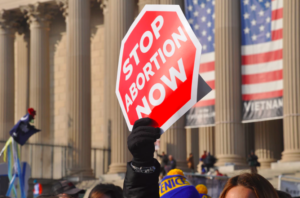If you ever thought as a woman you had control over your own body, you’ve been misled, as abortion ban laws have been passed in the US.
Whilst we were focusing on the Australian federal election, we neglected to look worldwide as women’s reproductive rights suddenly took another large step back into the 1920s.
Last week, the state of Alabama approved legislation to ban abortions. Alabama is only one of many states across the US that has passed legislation to ban abortions.
The states have revised their legislation following the 1973 ruling Roe v Wade which legalised abortion in the US. Now states are challenging this legislation and bolstering it to new perceptions of pro-life argument.
Georgia also has banned abortions, by their governor Brian Kemp signing a “foetal heartbeat” bill. This means that abortions are banned at the first signs of a foetal heartbeat, which occurs around six weeks of pregnancy. One thing to note, most women do not know they are pregnant by six weeks of pregnancy.

Kemp claims, “Georgia is a state that values life”, but according to the American College of Obstetricians and Gynaecologists, an embryo is not considered a foetus until eight weeks after fertilisation. Doctors measure the start of a pregnancy from the women’s last menstrual period, which usually equates to about two weeks. So, this all adds up to be 10 weeks after conception, but according to Georgia’s new laws, a foetal heartbeat is at six weeks. You do the maths.
Alabama, as the most recent state to ban abortion in the US, has passed to ban abortion from the eighth week of pregnancy. However, Governor Kay Ivey has also signed into effect that performing an abortion after this period is a crime, and doctors who perform it could end up in prison for 99 years. Alabama has also included complete abortion ban for all cases after the eighth week, even in cases of rape and incest. Alabama has officially signed in the most restrictive abortion legislation, but the competition is still open for other states in the US to try and restrict further. Can you see how this is problematic?
Can we also note, that the Alabama Governor Kay Ivey is a woman, who signed in legislation that vastly restricts the control that women have over their own bodies. So if you thought that only men in the US government are dictating these decisions, you’re once again poorly misled. Women have these views too.
Kentucky, Mississippi and Ohio have also banned abortions at the “foetal heartbeat” phase. These states paved the way for Georgia’s tight abortion laws. Mississippi’s governor, Phil Bryant, described a foetal heartbeat as “the universal hallmark of life.”
All of these states have passed strict abortion laws, however 16 other states across the US are now looking to bolster and tighten their abortion legislation.
US District Judge Carlton Reeves opposed the abortion bans in Mississippi in 2018, and is now contesting it once again.
Reeves states, “So, a child who is raped at 10 or 11 years old, that child does not open their mouth, doesn’t tell their parents, the rapist may be in their home, nobody discovers until it’s too late — that is a foetal heartbeat has been detected — that child must bring the foetus to term under this statute, if the foetal heartbeat can be detected.”
Planned Parenthood has joined the American Civil Liberties Union to file a legal challenge to the abortion legislation. Abortion rights activists across the US have taken to the streets to protest the anti-abortion laws.

The hashtag #StopTheBans has gone viral across social media with celebrities around the world challenging the conservative and restrictive legislations.
This brings us to think about our own country, and what the abortion laws and access is like for women in Australia. Do we as women in Australia have more control over our reproductive rights?
Women in Australia can receive an abortion up until 14 weeks in clinics nationwide. Any further along than this, the laws then vary state to state. In NSW, it is a little bit more difficult for women to receive an abortion in contrast to other states. The woman’s doctor must honestly believe the operation is required to save her life or preserve her mental wellbeing. In Queensland, abortion was only decriminalised last year. In 2018. In the 21st century. Are you surprised after this last election? I think not.
Australia is comparatively more lenient and accepting of abortions than the US, evident by the legislation.
Australia also offers two different types of abortions: medical and surgical.
Medical abortions are performed up until nine weeks of pregnancy, whilst surgical abortion is performed after nine weeks until 14 weeks.
Access is more readily available across states in Australia, but by no means is it easy to receive an abortion as an Australian woman. Australia still has a long way to go in reproductive rights, but thankfully Australian women do have more reproductive rights than our counterpart, the US.
Anti-abortions laws are removing women’s reproductive rights, and in 2019 it seems that we’re only heading backwards in terms of our control over our own bodies. Who can dictate whether or not you can terminate an unwanted pregnancy? The argument is a woman’s body is her choice, however the the United States have completely removed this choice.

